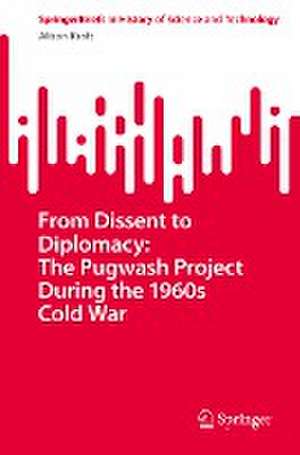From Dissent to Diplomacy: The Pugwash Project During the 1960s Cold War: SpringerBriefs in History of Science and Technology
Autor Alison Kraften Limba Engleză Paperback – 23 oct 2022
Din seria SpringerBriefs in History of Science and Technology
- 8%
 Preț: 387.77 lei
Preț: 387.77 lei -
 Preț: 377.18 lei
Preț: 377.18 lei -
 Preț: 443.75 lei
Preț: 443.75 lei -
 Preț: 377.35 lei
Preț: 377.35 lei -
 Preț: 377.35 lei
Preț: 377.35 lei -
 Preț: 378.34 lei
Preț: 378.34 lei -
 Preț: 379.09 lei
Preț: 379.09 lei -
 Preț: 378.54 lei
Preț: 378.54 lei -
 Preț: 378.34 lei
Preț: 378.34 lei -
 Preț: 377.73 lei
Preț: 377.73 lei -
 Preț: 448.21 lei
Preț: 448.21 lei -
 Preț: 377.35 lei
Preț: 377.35 lei -
 Preț: 408.66 lei
Preț: 408.66 lei -
 Preț: 478.33 lei
Preț: 478.33 lei - 20%
 Preț: 296.67 lei
Preț: 296.67 lei -
 Preț: 411.16 lei
Preț: 411.16 lei -
 Preț: 374.30 lei
Preț: 374.30 lei -
 Preț: 379.09 lei
Preț: 379.09 lei -
 Preț: 489.30 lei
Preț: 489.30 lei -
 Preț: 378.54 lei
Preț: 378.54 lei -
 Preț: 476.57 lei
Preț: 476.57 lei -
 Preț: 378.92 lei
Preț: 378.92 lei - 15%
 Preț: 461.87 lei
Preț: 461.87 lei -
 Preț: 442.83 lei
Preț: 442.83 lei -
 Preț: 446.08 lei
Preț: 446.08 lei -
 Preț: 379.48 lei
Preț: 379.48 lei -
 Preț: 344.53 lei
Preț: 344.53 lei -
 Preț: 378.92 lei
Preț: 378.92 lei -
 Preț: 376.04 lei
Preț: 376.04 lei -
 Preț: 347.41 lei
Preț: 347.41 lei -
 Preț: 324.70 lei
Preț: 324.70 lei -
 Preț: 377.35 lei
Preț: 377.35 lei -
 Preț: 444.35 lei
Preț: 444.35 lei
Preț: 379.86 lei
Nou
Puncte Express: 570
Preț estimativ în valută:
72.72€ • 75.88$ • 60.96£
72.72€ • 75.88$ • 60.96£
Carte tipărită la comandă
Livrare economică 13-27 martie
Preluare comenzi: 021 569.72.76
Specificații
ISBN-13: 9783031121340
ISBN-10: 3031121341
Pagini: 140
Ilustrații: IX, 140 p. 6 illus.
Dimensiuni: 155 x 235 x 11 mm
Greutate: 0.22 kg
Ediția:1st ed. 2022
Editura: Springer International Publishing
Colecția Springer
Seria SpringerBriefs in History of Science and Technology
Locul publicării:Cham, Switzerland
ISBN-10: 3031121341
Pagini: 140
Ilustrații: IX, 140 p. 6 illus.
Dimensiuni: 155 x 235 x 11 mm
Greutate: 0.22 kg
Ediția:1st ed. 2022
Editura: Springer International Publishing
Colecția Springer
Seria SpringerBriefs in History of Science and Technology
Locul publicării:Cham, Switzerland
Cuprins
Chapter 1. Introduction.- Chapter 2. Moscow, late 1960: A breakthrough in East-West dialogue.- Chapter 3. Stowe, VT, September 1961: two contrasting conferences in America.- Chapter 4. The Pugwash leadership: Informal diplomacy beyond the conferences, 1962-1967.- Chapter 5. The politics of European security: a step too far for Pugwash?.- Chapter 6. Conclusion.
Notă biografică
Alison Kraft is an historian of science, technology and medicine in the twentieth century. She has published widely on the history of the life sciences, encompassing institutional, disciplinary and technological perspectives. Recently she has focused on the international dimensions of science. One research theme has centred on ‘science and peace’, focusing on the Pugwash organization during the early Cold War, including its role in informal nuclear diplomacy. This work has been published in the Journal of Cold War Studies (2018), and in a co-edited book, Science, (Anti-)Communism and Diplomacy: The Pugwash Conferences on Science and World Affairs in the Early Cold War (Leiden: Brill, 2020). Most recently, as part of the History of the Max Planck Society project, her research is analyzing the processes and effects of Europeanization and internationalization at the Max Planck Society 1948-2002, especially the dynamics of institutional,disciplinary and epistemological change.
Textul de pe ultima copertă
Caracteristici
Explores the means and mechanics of the Track II role of the Pugwash organization Breaks new ground in situating the PCSWA within the contemporary framework of Science Diplomacy Analyzes how, when, and why the PCSWA sought to engage with the countries of the “Global South”
